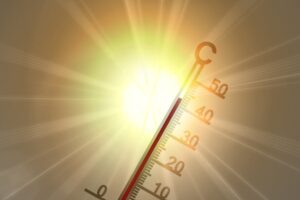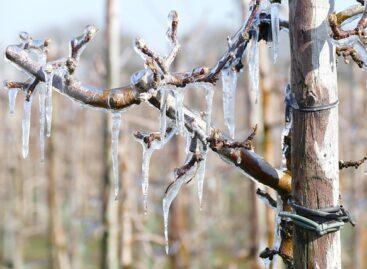This summer could be hotter than 40 degrees: this is how farmers can protect themselves against the heat waves of 2025
Hungary is once again facing extreme weather this summer, with heat records above 40 degrees Celsius, droughts and a multitude of sudden storms – but farmers are already preparing for the challenges. Plant protection and increasingly advanced agricultural technologies can help significantly.
 The forecasts for this summer do not promise much good for domestic agriculture. Long-lasting heat waves, recurring droughts, increasingly frequent stormy winds and drying air movements are expected. These conditions are putting increasing pressure not only on the human body, but also on domestic agriculture.
The forecasts for this summer do not promise much good for domestic agriculture. Long-lasting heat waves, recurring droughts, increasingly frequent stormy winds and drying air movements are expected. These conditions are putting increasing pressure not only on the human body, but also on domestic agriculture.
“Extreme weather is no longer an extraordinary phenomenon, but is increasingly part of our everyday lives. However, its impact on plants is worsening: the water balance is disrupted, cells are damaged, and their defenses are weakened”
– drew attention to Dr. Gerda Anikó, a plant specialist and consultant at Vitafer Hungária Kft.
According to the expert, the situation of farmers is particularly difficult in sensitive crops such as vegetables and fruits, which react quickly and spectacularly to heat and uneven rainfall.
How do plants react to heat? Stress is not just a human problem
“This summer, in extreme cases, temperatures of up to 40-45 degrees Celsius are possible. Apples, potatoes, sunflowers and sugar beets are also particularly sensitive to heat. In addition, corn, which, based on global trends, can produce a yield loss of up to more than 7% for every 1 degree Celsius increase in average temperature, is therefore significantly exposed to the effects of global warming”
– emphasized the consultant of Vitafer Hungária Kft.
When the temperature rises permanently above 30 degrees Celsius, the functioning of plants slows down significantly. Photosynthesis declines, the cells are less able to bind water, and it also becomes increasingly difficult to absorb nutrients. This combination opens the door to diseases and pests.
“Many farmers complain that suddenly, from one day to the next, aphids appear or powdery mildew takes over. This is no coincidence: weakened plants are much more vulnerable”
– emphasized Dr. Gerda Anikó, who added that prevention is usually much more effective and cheaper than firefighting.
Related news
Agrometeorology: mild weather disrupts the dormant state of plants
🎧 Hallgasd a cikket: Lejátszás Szünet Folytatás Leállítás Nyelv: Auto…
Read more >Mobile networks also receive extra attention in the unusual cold
🎧 Hallgasd a cikket: Lejátszás Szünet Folytatás Leállítás Nyelv: Auto…
Read more >Wizz Air: passengers should constantly monitor flight information
🎧 Hallgasd a cikket: Lejátszás Szünet Folytatás Leállítás Nyelv: Auto…
Read more >Related news
KSH: retail turnover in January exceeded the same period of the previous year by 3.5 percent and the previous month by 0.5 percent
🎧 Hallgasd a cikket: Lejátszás Szünet Folytatás Leállítás Nyelv: Auto…
Read more >A magyar csapat március 15-én lép színpadra a Bocuse d’Or Európai Válogatóján
🎧 Hallgasd a cikket: Lejátszás Szünet Folytatás Leállítás Nyelv: Auto…
Read more >REGIO Játék: 25.4 billion forints in sales and international opening
🎧 Hallgasd a cikket: Lejátszás Szünet Folytatás Leállítás Nyelv: Auto…
Read more >









